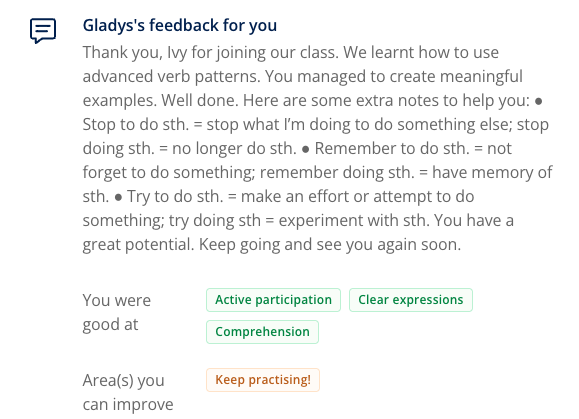Lingoda Group Class Notes 59
Topic: Advanced verb patterns
Related skill: Grammar
Date: 14 December 2024
Teacher: Gladys
What I've learned
Idioms
to think highly of someone or something
- Meaning: to have a very positive opinion of someone or something.
- Example: I think very highly of Margaret’s advice. She always has great suggestions!
Grammar
Verbs that take both 'to' + infinitive and the '-ing' form
As you know, when two verbs appear together, they follow a pattern.
In some cases, the first verb is followed by to + infinitive. In others, by a verb in the -ing form.
Take hope and enjoy: you hope to do something but you enjoy doing it.
Some verbs can only be followed by to + infinitive or the -ing form. It is wrong to use the other construction.
✘ He enjoys to meet new people. ✓ He enjoysmeeting new people.
✘ They're thinking of to split up. ✓ They’rethinking of splitting up.
✘ They managed meeting up last week. ✓ Theymanaged to meet up last week.
Verbs which can take either to + infinitive or -ing form
Some verbs can be followed by either without a change in meaning:
- He likes to talk/talking about himself.
- He loves to talk/talking about himself.
Be careful with would + like, loveand prefer. They use to + infinitive:✘ She would like meeting new people. ✓ Shewould like to meet new people.
Verbs that change their meaning between to + infinitive or -ing form
Some verbs can be followed by either, but the meaning of the sentence changes.
Remember has two meanings depending on whether it is used with to + infinitive or -ing form.
- He remembered to meet you. (=He didn’t forget topick you up.)
- He remembers meeting you. (=He hasn’t forgottenthat he met you once.)
Try also has two different meanings depending on whether it is followed by to + infinitive or -ing form.
- Try to do some exercise every day. (=I know you'llfind this difficult, but it's important.)
- Try doing some exercise every day. (=I'm suggestingthis as an experiment. It shouldn't be too difficult.)
Stop changes its meaning completely with the two patterns.
- She hasn't stopped to think about it. (=She hasgiven the matter no thought at all.)
- She hasn't stopped thinking about it. (=She hasbeen thinking about it all the time.)
Review
4/5
Same teacher possibility: 50%
